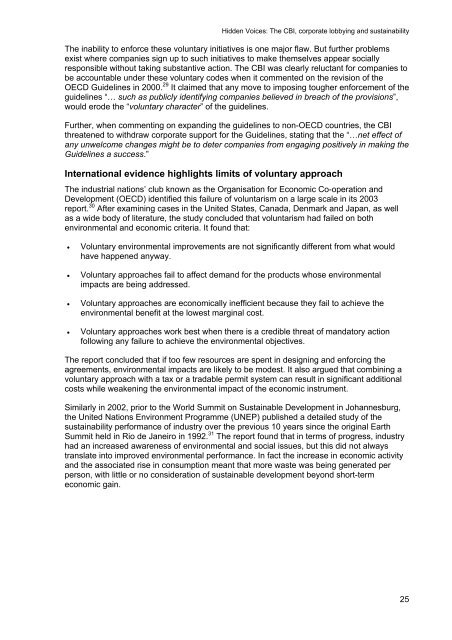hidden_voices
hidden_voices
hidden_voices
Create successful ePaper yourself
Turn your PDF publications into a flip-book with our unique Google optimized e-Paper software.
Hidden Voices: The CBI, corporate lobbying and sustainabilityThe inability to enforce these voluntary initiatives is one major flaw. But further problemsexist where companies sign up to such initiatives to make themselves appear sociallyresponsible without taking substantive action. The CBI was clearly reluctant for companies tobe accountable under these voluntary codes when it commented on the revision of theOECD Guidelines in 2000. 29 It claimed that any move to imposing tougher enforcement of theguidelines “… such as publicly identifying companies believed in breach of the provisions”,would erode the “voluntary character” of the guidelines.Further, when commenting on expanding the guidelines to non-OECD countries, the CBIthreatened to withdraw corporate support for the Guidelines, stating that the “…net effect ofany unwelcome changes might be to deter companies from engaging positively in making theGuidelines a success.”International evidence highlights limits of voluntary approachThe industrial nations’ club known as the Organisation for Economic Co-operation andDevelopment (OECD) identified this failure of voluntarism on a large scale in its 2003report. 30 After examining cases in the United States, Canada, Denmark and Japan, as wellas a wide body of literature, the study concluded that voluntarism had failed on bothenvironmental and economic criteria. It found that:• Voluntary environmental improvements are not significantly different from what wouldhave happened anyway.• Voluntary approaches fail to affect demand for the products whose environmentalimpacts are being addressed.• Voluntary approaches are economically inefficient because they fail to achieve theenvironmental benefit at the lowest marginal cost.• Voluntary approaches work best when there is a credible threat of mandatory actionfollowing any failure to achieve the environmental objectives.The report concluded that if too few resources are spent in designing and enforcing theagreements, environmental impacts are likely to be modest. It also argued that combining avoluntary approach with a tax or a tradable permit system can result in significant additionalcosts while weakening the environmental impact of the economic instrument.Similarly in 2002, prior to the World Summit on Sustainable Development in Johannesburg,the United Nations Environment Programme (UNEP) published a detailed study of thesustainability performance of industry over the previous 10 years since the original EarthSummit held in Rio de Janeiro in 1992. 31 The report found that in terms of progress, industryhad an increased awareness of environmental and social issues, but this did not alwaystranslate into improved environmental performance. In fact the increase in economic activityand the associated rise in consumption meant that more waste was being generated perperson, with little or no consideration of sustainable development beyond short-termeconomic gain.25


